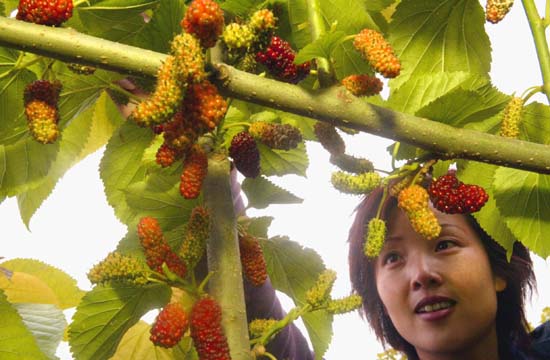Going 'green' proves lucrative for farmers
Updated: 2013-02-04 10:36
By Xie Yu in Shanghai (China Daily)
|
||||||||
|
 |
|
A tourist picking mulberries in an orchard on Chongming island, Shanghai. Chongming, the biggest offshore island within Shanghai and also the least industrialized region within the city limits, is actively promoting its organic agricultural products. [Photo/China Daily] |
Organic produce cultivates a healthy profit margin, say producers on Shanghai island
Zhao Fenna, a farmer in her 50s, is doing a roaring trade in the market despite selling vegetables and other agricultural produce that are smaller, more expensive and less pristine than those of her rivals.
"That's because I am selling 'green', 'ecological' products from Chongming," she said.
Chongming county, the biggest offshore island and also the least industrialized region within the city limits of Shanghai, actively promotes its organic agricultural products.
"It turns out that our food, including cauliflowers, asparagus and organic rice, is highly popular in the market. Chongming has become the biggest vegetable source for Shanghai," said Zhao Qi, county head of Chongming.
Chongming white hyacinth beans, asparagus, crab field rice, sweet sorgo, sweet and crispy taro, gold melons, yams, goat meat and crabs also sell well in the market.
There are 175 outlets all over the city in which we can sell agricultural products grown on Chongming, Zhao said. The number will climb to 500 to 700 in three to five years.
In an era when food scandals strike from time to time, the business of producing safe food is full of opportunity.
"I expanded our production volume last year but now we can no longer meet the demand," said Song Yongjiu, manager of Qimao farmers' cooperative on Chongming island, which specializes in growing 'ecological' rice crops.
It is called 'ecological' because we use less pesticide and less fertilizer. Our formula was designed by professors at agriculture institutions, he said.
This cooperative produced more than 2,000 tons of rice last year. It sells at 8 yuan ($1.3) a kilogram, double that of ordinary rice.
Song said growing "pure organic" rice crops, which require no pesticides or chemical fertilizers, would be too costly for him.
"It is very hard to avoid plant diseases or pests. It is even harder to make money if you add in the expense of renting the land," he said.
But Song said he is committed to working with the professors to discover how to use as few chemicals as possible while at the same time achieving a high output.
"It is important to find the balance because consumers nowadays attach great importance to the source of food," he said.

 Li Na on Time cover, makes influential 100 list
Li Na on Time cover, makes influential 100 list
 FBI releases photos of 2 Boston bombings suspects
FBI releases photos of 2 Boston bombings suspects
 World's wackiest hairstyles
World's wackiest hairstyles
 Sandstorms strike Northwest China
Sandstorms strike Northwest China
 Never-seen photos of Madonna on display
Never-seen photos of Madonna on display
 H7N9 outbreak linked to waterfowl migration
H7N9 outbreak linked to waterfowl migration
 Dozens feared dead in Texas plant blast
Dozens feared dead in Texas plant blast
 Venezuelan court rules out manual votes counting
Venezuelan court rules out manual votes counting
Most Viewed
Editor's Picks

|

|

|

|

|

|
Today's Top News
Boston bombing suspect reported cornered on boat
7.0-magnitude quake hits Sichuan
Cross-talk artist helps to spread the word
'Green' awareness levels drop in Beijing
Palace Museum spruces up
First couple on Time's list of most influential
H7N9 flu transmission studied
Trading channels 'need to broaden'
US Weekly

|

|







